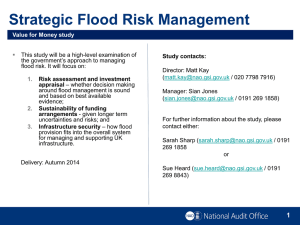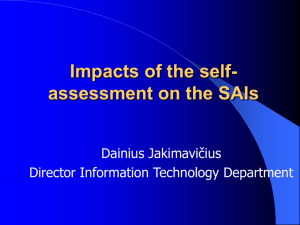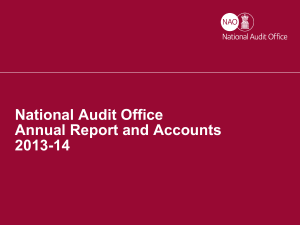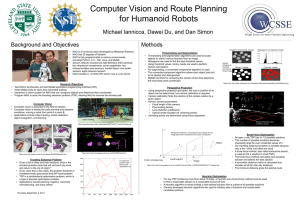Tim Banfield, Director, National Audit Office
advertisement
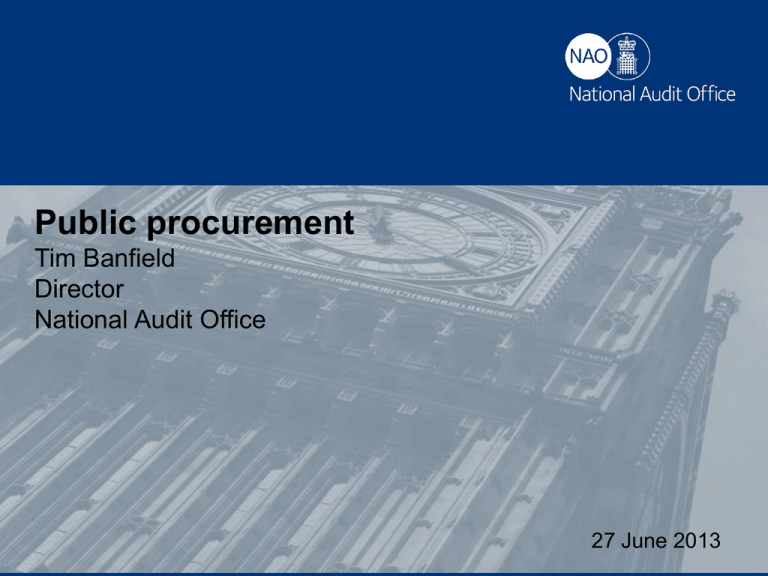
Public procurement Tim Banfield Director National Audit Office 27 June 2013 Four aspects: • • • • Why projects matter for government; Our evaluative approach; How we are developing our skills; How we share insights. Why projects matter for government • Projects are the currency to deliver change; • 95 percent of government policy is delivered through projects; • The majority of public sector projects do not deliver as expected; • Failures may relate to efficiency (ie not delivering to time/cost/performance) and/or effectiveness (not achieving the desired benefit/policy outcome); • The private sector isn’t much better. HMT DCLG DfID ONS FCO NS&I CO HMRC DCMS £20m £115m £423m £521m £713m MoD £150,782m £840m £1,218m £1,221m £1,465m GMPP DEFRA £3,969m £384 bn DECC DfE £6,699m £89,068m MoJ £7,736m DfT HO £12,489m HO £13,201m BiS DoH DoH £20344 £19,927 m DWP DWP £26951m £26,506 m £46,970 m Characteristics Vested interests in projects Decommissioning challenges Complex accounting - Strategically important programmes - High value/risk/ reward - Unique projects, complex & uncertain - Long-term horizons Contingency planning and maintain/replace decisions Management and maintenance of current asset base Long supply chains Providers of last resort for strategic national services Operational impacts, some managed through third parties Governance & accountability Management challenges Complex CBA Contracting with powerful players Resource constraints Financial management Business transformation There are plenty of examples of good project planning and execution……… Few could have envisaged how successful the London 2012 Games would turn out to be. The construction programme was completed on time and within budget, 11 million tickets were sold and our athletes excelled. Crucially, the Games passed off without major transport disruption or security incident. Taken as a whole, the Games were a success by any reasonable measure and it looks as if not all of the Funding Package will be used. Our evaluative approach How we look at project delivery (1) Value for money Delivery Environment & Complexity Desired Capability state Current State of Capability Influencing improvement Would you bet your own money on this project delivering the policy objectives There are ten factors common to projects. They provide a framework to: • • • Understand the specific challenges the project faces; Assess whether the bespoke delivery approach proposed is realistic; Judge whether the project has a good chance of achieving its objectives. Source: NAO analysis of over 3,500 projects How we look at project delivery (2) Value for money Judgement Organisational Competency Delivery Environment & Complexity Desired Capability state Portfolio Prioritisation and Management Individual Project & Programmes Knowledge Base Intelligence on current portfolio of major projects • What works, fails, why and effect • Capability across government • Departmental assessments Influencing improvement Current State of Capability How we are developing our skills Indicative Roles, Contributions Capability Growth Path Capability * Expert * Experienced Knowledgeable * Novice * Evaluation Point Role Complexity of Project (DECA) Basic Project Management tools techniques Understanding leadership & behaviour NAO Knowledge/ Back Catalogue exploitation NAO Analytics External Profile Lead interventions, advisory & quality assurance Complex Expert in some aspect, competent in most Application of analytics & interpretation Comprehensive knowledge & interpretation Thought leader Thought leadership NAO ambassador Manage delivery & apply complex analytics & quality assurance Complex Competent in most, growing expertise in some Application of analytics & interpretation Comprehensive knowledge & some interpretation Lead development Recognised expertise NAO ambassador Lead application of analytics & quality assurance Complicated Competent in some & potential expertise identified Awareness of dynamics & analytical tools Interrogate & utilise appropriately Contribute to development Contribute to debate NAO ambassador Supporting Simple Appreciation Awareness Access & understanding Awareness & understanding Engages Time Competencies Portfolio of Evidence (Authentic, Valid, Reliable, Current, Sufficient) Attribute Based - Professional qualifications - CPD - Contribution to development of profession - Specific qualifications e.g. PRINCE 2 - Assurance/Gateway reviewer Unit Elements Why it Matters Illustrative Techniques/ Attributes Understanding success • • • Translating policy intent Benefits optimisation Requirement setting • • • • Systems engineering Value engineering Benefits management Sponsorship Designing the delivery approach • • • Parliamentary procedure Organisation design • • Understanding the delivery environment & complexity Alternative delivery models The legal & legislative framework Making investment decisions • • Time and cost forecasting Risk and uncertainty controls • • • • • • Estimations Monte Carlo simulation Reference class forecasting Historic trend analysis Risk management Scenario modelling CBA & business cases Delivery through/ with others • • • Commercial engagement Engagement with other delivery partners Broader stakeholder/ influencer relationships • • • • Legal & EU law Contractual design Negotiation Stakeholder mapping & relationship mgt Public enquiries & legal challenge Portfolios presentation Performance Based Collegiate Behaviours - NAO intervention experience - Analytic development - Corporate knowledge development - Secondment - Previous career - External engagement - Academic engagement & research - Support to colleagues - Learn contribution - Ability to work with clients Behavioural aspects • • • • Delivery leadership Organisation & personal incentives The operating environment Skills & capability development Project prioritisation • • • • Project controls Change management Disputes Interdependencies • • • • • EVM Schedule design Dispute resolution/ arbitration Team building & dynamics Decision making Transition to BAU • • • Acceptance Process & cultural alignment Learning & applying knowledge • Change management The Norwegian Approach How we share insights The range of assurance options Five factors influencing successful delivery Five key elements for initiating successful projects The 4 Pillars of the Major Projects Authority THE MPA LEADERSHIP GMPP GOVERNMENT MAJOR MAJORACADEMY PROJECTS OPERATING ACHIEVEMENTS PROJECTS PORTFOLIO LEADERSHIP ACADEMY ENVIRONMENT & LEARNING • Portfolio class project leaders • Portfolio •World • World class Management •The ultimate Management project leaders Approach • On Time •Much improved outcomes • On Time • Much improved •The ultimate outcomes • On Budget Structure • On Budget •Value for money • Value for • Delivering •The ultimate • Delivering money Specified Benefits process Specified Benefits •Interactive electronic dimension •Advanced access systems •Sophisticated alignment tool Thinking differently about success 1. Outputs Performance Time Cost Quality 2. Outcomes How the project is used Impact Relevance Take -up 3. Benefits What value is added to society (realisation of policy) Sustainability Satisfies needs Economic effects Tim Banfield Tel: Fax: +44 20 7798 7662 +44 20 7798 7588 E-mail: tim.banfield@nao.gsi.gov.uk Website: www.nao.org.uk
